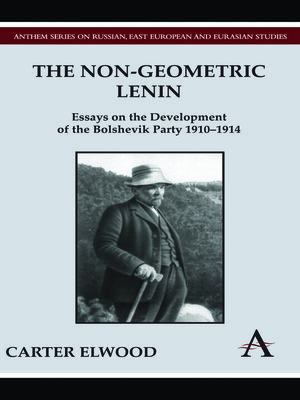The Non-Geometric Lenin
ebook ∣ Essays on the Development of the Bolshevik Party 1910-1914 · Anthem Series on Russian, East European and Eurasian Studies
By Carter Elwood

Sign up to save your library
With an OverDrive account, you can save your favorite libraries for at-a-glance information about availability. Find out more about OverDrive accounts.
Find this title in Libby, the library reading app by OverDrive.



Search for a digital library with this title
Title found at these libraries:
| Library Name | Distance |
|---|---|
| Loading... |
This book is a collection of eleven essays dealing with important but little-studied episodes in Lenin's attempt to build a Bolshevik Party before 1914. It also deals with his defence of Roman Malinovsky, who turned out to be a police spy, and his romantic involvement with a fellow Bolshevik, Inessa Armand. The last three essays paint a picture of a 'non-geometric' Lenin and his little-known interests in food, holidaying and sports.
|This collection of eleven essays deals with Lenin's life in western European emigration in the years before the First World War. The first five essays explore Lenin's efforts to build a purely Bolshevik Party through the creation of a unique school for underground workers outside of Paris, his schismatic machinations in calling the 1912 Prague Conference, his problematic relations with the new Bolshevik daily 'Pravda', his unsuccessful attempt to call a party congress in 1914, and his defeat at the Brussels 'Unity' Conference summoned by the International Socialist Bureau on the eve of the war. These essays are based on a detailed reading of Western and Soviet sources, and they question the common assumption that Lenin was unquestioned inside his own faction and that pre-war Bolshevism was a monolithic entity well-prepared to seize power.
The latter essays discuss Lenin's curious friendship during the pre-war period with Roman Malinovsky, who turned out to be a police spy, and Inessa Armand, a Bolshevik feminist with whom he had a romantic relationship. They also investigate such mundane but little-studied topics as what he liked to eat in emigration, his annual habit of taking bourgeois vacations and his obsession with athletic pursuits. The picture which emerges from these studies is not of a single-minded, perfect leader solely devoted to carrying out revolution, but rather of a 'non-geometric' Lenin with very human foibles and weaknesses.







